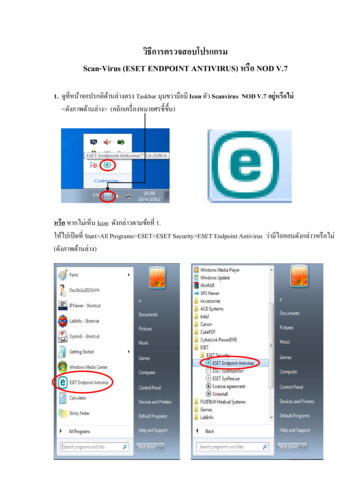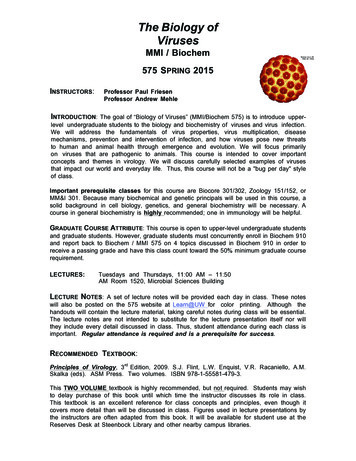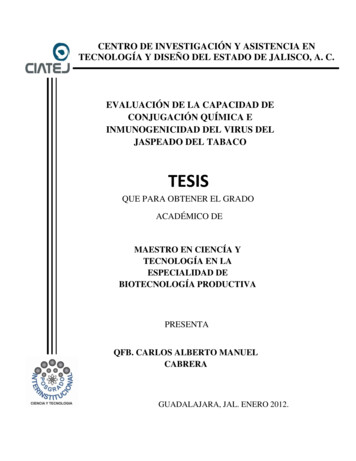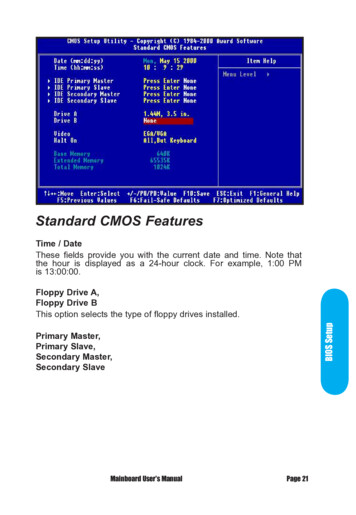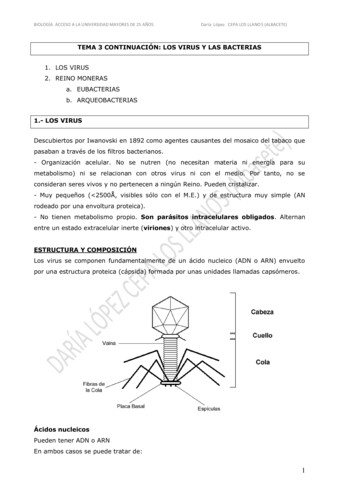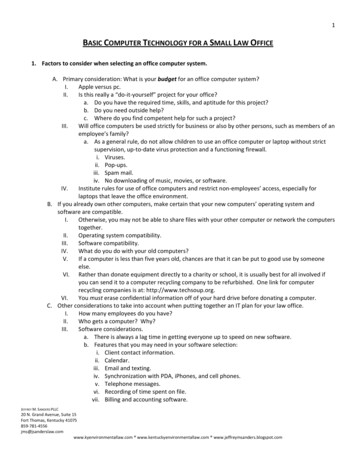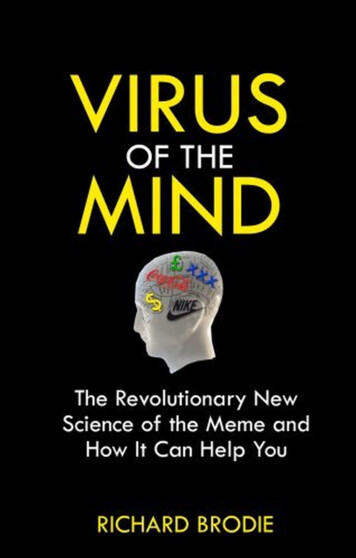
Transcription
OF THE
Also by Richard BrodieGetting Past OK: A Straightforward Guideto Having a Fantastic LifetttHay House Titles of Related InterestYOU CAN HEAL YOUR LIFE, the movie,starring Louise L. Hay & Friends(available as a 1-DVD program and an expanded 2-DVD set)Watch the trailer at: www.LouiseHayMovie.comthe shift: the movie,starring Wayne W. Dyer(available as a 1-DVD program and an expanded 2-DVD set)Watch the trailer at: www.DyerMovie.comtttASK & IT IS GIVEN: Learning to Manifest the Law of Attraction,by Esther & Jerry HicksTHE BIOLOGY OF BELIEF: Unleashing the Power of Consciousness,Matter & Miracles, by Bruce H. Lipton, PhDDESTINY vs. FREE WILL: Why Things Happen the Way They Do,by David R. Hamilton, PhDFRACTAL TIME: The Secret of 2012 and a New World Age,by Gregg BradenPOWER vs. FORCE: The Hidden Determinants of Human Behavior,by David R. Hawkins, MD, PhDSTOP THE EXCUSES! How to Change Lifelong Self-DefeatingThinking Habits, by Dr Wayne W. DyerPlease visit Hay House UK: www.hayhouse.co.ukHay House USA: www.hayhouse.com Hay House Australia: www.hayhouse.com.auHay House South Africa: www.hayhouse.co.zaHay House India: www.hayhouse.co.in
OF THEThe New Science of the MemeRichard Brodie
Published and distributed in the United Kingdom by:Hay House UK Ltd, 292B Kensal Rd, London W10 5BE. Tel.: (44) 20 8962 1230;Fax: (44) 20 8962 1239. www.hayhouse.co.ukPublished and distributed in the United States of America by:Hay House, Inc., PO Box 5100, Carlsbad, CA 92018-5100. Tel.: (1) 760 431 7695or (800) 654 5126; Fax: (1) 760 431 6948 or (800) 650 5115. www.hayhouse.comPublished and distributed in Australia by:Hay House Australia Ltd, 18/36 Ralph St, Alexandria NSW 2015.Tel.: (61) 2 9669 4299; Fax: (61) 2 9669 4144. www.hayhouse.com.auPublished and distributed in the Republic of South Africa by:Hay House SA (Pty), Ltd, PO Box 990, Witkoppen 2068.Tel./Fax: (27) 11 467 8904. www.hayhouse.co.zaPublished and distributed in India by:Hay House Publishers India, Muskaan Complex, Plot No.3, B-2, Vasant Kunj,New Delhi – 110 070. Tel.: (91) 11 4176 1620; Fax: (91) 11 4176 1630.www.hayhouse.co.inDistributed in Canada by:Raincoast, 9050 Shaughnessy St, Vancouver, BC V6P 6E5. Tel.: (1) 604 323 7100;Fax: (1) 604 323 2600 Richard Brodie, 2009The moral rights of the author have been asserted.All rights reserved. No part of this book may be reproduced by any mechanical,photographic or electronic process, or in the form of a phonographic recording;nor may it be stored in a retrieval system, transmitted or otherwise be copied forpublic or private use, other than for ‘fair use’ as brief quotations embodied inarticles and reviews, without prior written permission of the publisher.The author of this book does not dispense medical advice or prescribe the use ofany technique as a form of treatment for physical or medical problems withoutthe advice of a physician, either directly or indirectly. The intent of the authoris only to offer information of a general nature to help you in your quest foremotional and spiritual wellbeing. In the event you use any of the informationin this book for yourself, which is your constitutional right, the author and thepublisher assume no responsibility for your actions.A catalogue record for this book is available from the British Library.ISBN 978-1-84850-127-0Previously published by Integral Press (ISBN 978-0-9636001-2-7)Printed and bound in the UK byTJ International, Padstow, Cornwall.
For my mother,Mary Ann Brodie,who got me thinking . . .
ContentsIntroduction: Crisis of the r1: Memes.12: Mind and Behavior.173: Viruses.354: Evolution.475: The Evolution of Memes.656: Sex: The Root of All Evolution.89Chapter 7:Survival and Fear.111Chapter 8: How We Get Programmed.125Chapter 9: Cultural Viruses.147Chapter 10: The Memetics of Religion.181Chapter 11: Designer VirusesChapter(How to Start a Cult).19512: Disinfection.211Recommended Reading.231Acknowledgments.235Index.237About the Author.249
Warning: This book contains a live mind virus. Do not read further unlessyou are willing to be infected. The infection may affect the way you think insubtle or not-so-subtle ways—or even turn your current worldview inside out.
IntroductionCrisis of the Mind“What a waste it is to lose one’s mindor not to have a mind is very wasteful.”— Dan Quayle, mutating the memes in the United NegroCollege Fund’s motto, “A mind is a terrible thing to waste.”There is some good news in this book. So before I get into howmind viruses are spreading wildly throughout the world—infectingpeople with unwanted programming like the Michelangelo computer virus infects computers with self-destruct instructions—I’llstart with the good news. . . .The good news is that the long-awaited scientific theory unifying biology, psychology, and cognitive science is here. An interdisciplinary effort by scientists in all those fields over the last 20years or so—really back to 1859 and Charles Darwin, if you like—has produced a new science called memetics.The science of memetics is based on evolution. Darwin’s theory of the evolution of species by natural selection utterly transformed the field of biology. Scientists are now applying modernevolutionary theory to the way the mind works, the way peoplelearn and grow, and the way culture progresses. In so doing, thefield of psychology will ultimately be as transformed by the scientists researching memetics as biology was by Darwin.xiii
virusof themindFor those of us who yearn to understand ourselves, learningabout memetics gives us a huge amount of satisfaction. I alsobelieve that people who understand memetics will have an increasing advantage in life, especially in preventing themselves frombeing manipulated or taken advantage of. If you better understandhow your mind works, you can better navigate through a world ofincreasingly subtle manipulation.Now the bad news. . . . The bad news is that this book raisesmore questions than it answers. In particular, memetics has uncovered the existence of viruses of the mind but gives us few insightsinto what to do about them.Viruses of the mind have been with us throughout history, butthey are constantly evolving and changing. They are infectiouspieces of our culture that spread rapidly throughout a population,altering people’s thoughts and lives in their wake. Mind virusesinclude everything from the relatively harmless examples, such asminiskirts and slang phrases, to those that seriously derail people’slives, such as the cycle of unwed mothers on welfare, the Cripsand Bloods youth gangs, and the Branch Davidian religious cult.When these pieces of culture are ones we like, there’s no problem.However, just as the Michelangelo computer virus programs computers with instructions to destroy their data, viruses of the mindcan program us to think and behave in ways that are destructiveto our lives.This is the most surprising and most profound insight fromthe science of memetics: your thoughts are not always your ownoriginal ideas. You catch thoughts—you get infected with them,both directly from other people and indirectly from viruses of themind. People don’t seem to like the idea that they aren’t in controlof their thoughts. The reluctance of people to even consider thisnotion is probably the main reason the scientific work done so faris not better known. As we’ll see, ideas people don’t like have ahard time catching on.Further compounding the problem is that you don’t immediately know whether the programming you get from a given mindvirus is harmful or beneficial. Nobody ever joined a religious cultxiv
Introduction: Crisis of the Mindwith the intention of getting brainwashed, moving to Guyana,and committing suicide. When the teenage Bill Gates caught thepoker-playing mind virus at Harvard, was that harmful because itkept him from his studies? Or was it beneficial because it helpedsway his decision to drop out, start Microsoft, and become a multibillionaire?Paradigm ShiftEvery so often, the world of science experiences somethingcalled a paradigm shift. That happens when one of the basic,underlying assumptions we’ve been living with changes, such aswhen we shifted from looking at the universe as revolving aroundthe earth to the earth revolving around the sun. Another shiftoccurred when Einstein discovered the relationships between spaceand time and between energy and matter. Each of these paradigmshifts took some time to penetrate the scientific community andeven longer to become accepted by the general public.Viruses of the mind, and the whole science of memetics,represent a major paradigm shift in the science of the mind.Because understanding this new science involves a significantchange in the way people think about the mind and culture, ithas been difficult for them to grasp. As with any paradigm shift,memetics doesn’t fit into our existing way of looking at things, ofunderstanding the world.The trick to learning a new paradigm is to set aside your current one while you’re learning rather than attempt to fit the newknowledge into your existing model. It won’t fit! If you’re willing to set aside your current thinking long enough to considerfour concepts, some or all of which may be new to you, you’ll berewarded with an understanding of memetics. With that understanding, I hope, comes a call to action for anyone concerned withthe future of human life.xv
virusof themind— The first concept—the star of the show—is the meme,which I introduce in Chapter 1 and which plays a leading rolethroughout this book. The meme, which rhymes with “beam,” isthe basic building block of culture in the same way the gene is thebasic building block of life. As I outline in Chapter 2, memes arenot only the building blocks of culture on a large scale—makingup countries, languages, and religions—but also on a small scale:memes are the building blocks of your mind, the programming ofyour mental “computer.”— Second is the concept of virus. It’s well known that virusesexist in biology and in the world of computers. Now we’ll seehow they show up in the world of mind and culture, the world ofmemetics. In Chapter 3, I’ll draw parallels between the three different universes that viruses live in to show what we can expectfrom mind viruses in the future.— The third concept that contributes to this paradigm shift isevolution. Evolution is one of those words that many people use,thinking they are talking about the same thing but really havingdifferent ideas of what it is and means. I’ll discuss scientists’ mostcurrent theory of evolution in Chapter 4 and how it applies tomemes in Chapter 5.— The fourth concept necessary to understanding mindviruses is the new science of evolutionary psychology. This fieldexamines the biases and mechanisms of our minds that evolvedto support our survival and reproduction. Some of these biasestake the form of psychological buttons that can be pushed to penetrate our mental defenses. I called this part of the book “Crisis ofthe Mind” rather than simply “Introduction” because the formerpushes more buttons: it attracts more attention, and more peoplewill read it. I called this book Virus of the Mind rather than Introduction to Memetics for the same reason.Currently a controversial topic, evolutionary psychologyexplores and explains many of the stereotypical differencesxvi
Introduction: Crisis of the Mindbetween men and women, especially in the realm of matingbehavior. Chapter 6 is about the mating part of evolutionary psychology; Chapter 7 covers the survival aspect.Memetics builds on these four conceptual blocks to form anew paradigm of how culture evolved and is evolving. It illuminates a major decision point for humanity:Will we allow natural selection to evolve us randomly, without regard for our happiness, satisfaction, or spirit? Or will weseize the reins of our own evolution and pick a direction forourselves?Memetics gives us the knowledge and power to direct our ownevolution more than we’ve done at any time in history. Now thatwe have that power, what will we do with it?A Threat to HumanityA mind virus is not spread by sneezing, like the flu, or by sex,like AIDS. It’s not a physical thing. Mind viruses are spread bysomething as simple as communicating. I discuss the ways we getprogrammed by mind viruses in Chapter 8. In a way, mind virusesare the price of one of the freedoms most dear to us: freedom ofspeech. The more freedom there is to put forth any communication, the more welcoming the environment for mind viruses.Some mind viruses arise spontaneously, as I discuss in Chapters 9 and 10; some are created intentionally, as I cover in Chapter11. But all of them share one thing in common:Once created, a virus of the mind gains a life independentof its creator and evolves quickly to infect as many people aspossible.xvii
virusof themindViruses of the mind are not some far-off future worry like thesun burning out or the earth being hit by a comet. They are herewith us now—have been with us since before recorded history—and they are evolving to become better and better at their jobof infecting us. We are being infected in some new ways (television, popular music, sales techniques), but also in very ancientways (education, religious teachings, even talking to our closestfriends). Our parents unwittingly infected us when we were kids. Ifyou have children, chances are that you are spreading the virusesto them every day.Read a newspaper? Catch a mind virus. Listen to the radio?Catch a mind virus. Hang out with your friends and shoot thebreeze about nothing in particular? Catch one mind virus afteranother. If your life isn’t going the way you would like, you can betmind viruses are playing a large part. Having relationship problems?Mind viruses take over parts of your brain and divert you from whatwould give you long-term happiness. Having trouble in your job orcareer? Mind viruses cloud your future and steer you along a careerpath that supports their agenda, not your quality of life.Cult religions are springing up everywhere, the result of moreand more powerful mind viruses. These cults take control of people’s minds and make members engage in bizarre behavior, ranging from odd rituals to mass suicide. If you think you’re immune,remember: nobody ever set out intentionally to join a cult andhave their mind taken over. It’s the work of tricky and perniciousmind viruses. And once the founder of the cult starts the process,the virus of the mind takes on a life of its own.Because of mass media and direct elections, the U.S. and othergovernments are becoming more and more subject to infection bymind viruses. A politician today cannot be elected without coming up with an effective image that pushes people’s buttons andgets the votes. “We’re having a crisis, and only I can fix it,” theysay, or “Those other guys have caused all these problems; surelyany change is better than what we’ve got!” Politicians’ well-craftedimages are hooks into some of the most elaborate and pervasivemind viruses infecting society today.xviii
Introduction: Crisis of the MindWhat brand of soft drink do you buy? The ones that sell themost cost twice as much as unadvertised store brands. The extramoney goes into television advertising, sending out the sporesof ever-more-penetrating mind viruses that take control of yourmind and coerce you to push your shopping cart over to theirshelf. Successfully programming your mind to believe that youprefer that brand, advertising agencies are among the most brazenand calculating of the mind-virus instigators.The unchecked spread of mind viruses shows up most alarmingly in the state of our children today. Starting with the innercities and quickly spreading, the mind viruses infecting manykids are pushing them into hopelessness, single motherhood, andgang warfare. Many young people seem to be losing their sense ofvalues and taking off in some very unsettling directions. Chapter12 discusses the possibility of disinfection for our children andourselves.My AgendaLet me tell you right now—I have an agenda in writing thisbook, and that is to make a difference in people’s lives. Some ofthe content found herein could be used for self-improvement. Youmight not expect a book about science to include ideas from theself-development field, but the science of memetics deals with themind, with people’s lives. Understanding memetics can naturallyhelp increase the quality of people’s lives.In the first place, I would never have written this book—or myfirst one, Getting Past OK—if I had not intentionally disinfectedmyself of many of the memes that I got as I grew up and thenreprogrammed myself with new memes. What new memes wouldyou choose to reprogram yourself with, given the chance? That’sentirely up to you. I had no idea what that even meant when Istarted this research. Now that I do, I choose to program myselfwith memes that support my values in life rather than ones thatsupport the agendas of viruses of the mind. You can do that orxix
virusof themindsomething different. But you won’t have the option to do anything like that unless you understand memetics.The reason I’m writing this book is that I really enjoy makinga difference in people’s lives. I believe that knowledge of memetics is important, so I’m spreading the word. I’m not just writingthis book as an intellectual exercise. Although Virus of the Mind isabout science, it’s obviously not a scientific text. It’s designed withan intention, and that is to consciously spread the new paradigmof memetics because I think it’s of value.Consciously spreading ideas you consider important is oneway to combat mind viruses.Have you ever wondered why life seems so complicatedtoday—more complicated and stressful year after year? One reasonis the ever-evolving army of mind viruses, taking over a greaterand greater portion of your mind, diverting you from your pursuitof happiness and due to have an even greater effect on the nextgeneration.Ever wonder why, with greater and greater progress and technology, life doesn’t seem to get simpler, but just the reverse? Everytime you’re exposed to a new virus of the mind, your mind takeson just a little more stress, a little more confusion.People are flocking to everything from psychotherapy to theNew Age movement to try to relieve the crushing burden of stress.Doctors are more and more certain that excess stress is our numberone killer, but experts disagree on what causes stress and how tocure it. The medical community talked of stressed-out “type A”and laid-back “type B” personalities, with no clear idea of whatcaused someone to have one or the other. And even the “type B’s”had stress-related symptoms at times. The new science of memetics gives much insight into the problem of stress.Taking over bits of your mind and pulling you in different directions, mind viruses distract you from what’s mostimportant to you in life and cause confusion, stress, and evendespair.xx
Introduction: Crisis of the MindMind viruses infect your mind, programming you with directions that point you away from where you want to go. Since thishappens unconsciously, all you’re aware of is that as you growolder, life becomes more stressful, less fun, more of a drag, andless meaningful. You may feel your motivation slipping away. Youmay get less excited about things than you used to. These are someof the effects of infection by a virus of the mind, an infectionyou can’t avoid entirely short of living in complete isolation frombirth.You can, however, begin to disinfect yourself. My hope is thatthe understanding you gain from this book will be a big first stepin that disinfection. But it takes a bit of effort to teach yourself anew paradigm.Birth of a New ParadigmIt’s always been hard for scientists to communicate their ideasto the general public. Science, by its very nature, is an artificialselection of ideas based on rigorous testing of their usefulnessrather than on people’s gut feelings. As such, new scientific ideastend to rub people the wrong way at first and produce predictable reactions. When Charles Darwin first proposed his theorieson natural selection in 1859, there were several stages of publicreaction—ones that any revolutionary new scientific idea seems togo through before becoming accepted:1. Complacency/Marginalization. At first, the new theory isseen as an off-the-wall idea: quaint, but not a serious threat to thedominant worldview—perhaps a simple variant of some alreadyknown theory. Memetics is graduating from this stage to the nextas I write this. Editors of The New York Times Magazine of January22, 1995, picked up on the growing use of the word meme andmildly attempted to marginalize it: “A skeptic might wonder whatthe notion of a meme adds to the paradigm of cultural evolution.Perhaps there is nothing new under the sun.” By the end of thisxxi
virusof themindbook, you will discover that rather than adding to the existingparadigm of cultural evolution, memetics itself is a new and morepowerful paradigm.2. Ridicule. Complacency fades as the new idea refuses to die,resulting in ridicule by people who clearly and laughingly see thatit’s inconsistent with something they hold to be true. In Darwin’scase, contemporaries laughed at the naturalist’s inability to see thenecessity of a Supreme Designer doing the selecting. Darwin wasfrustrated by his seeming inability to communicate this new paradigm. Similar ridicule of memetics is seen from time to time in thefew places where this topic is discussed.3. Criticism. As the new idea gains acceptance, people whohave held conflicting worldviews for some time, or who have theirreputation invested in old paradigms, take off their gloves. Darwinism is still being attacked today by creationists, who believe itconflicts with their Truth. It’s possible that this book will touch offserious criticism of memetics. If it does, we shouldn’t worry; it’sthe nature of a paradigm shift.4. Acceptance. Finally, enough people make the leap to the newparadigm that it gains psychological as well as intellectual acceptance. Those who understand the new ideas are no longer as aloneand unloved as Columbus among the flat-Earth believers. The newworld agrees on the new paradigm. Peer pressure starts to work for itrather than against it. It begins to be taught in elementary schools.Scientists can move on to their next challenge.Our minds, it seems, are not well equipped to understand howthey themselves work. You, in fact, may at first be very confusedor distracted, or suddenly get tired, as you read this; you may evenbecome angry just from reading these words. Although right nowyou may think that this statement is absurd, those feelings andsymptoms are actually the defense mechanisms of mind viruses.xxii
Introduction: Crisis of the MindThey have evolved to be very protective of the parts of your mindthat they’ve stolen, and any attempts to cleanse yourself of themcan trigger reactions.If you experience one or more of these reactions while readingthis book, don’t worry: the reaction will pass if you ride it out. Ifyou do, you’ll be rewarded with a powerful tool for your future . . .and the future of humanity.tttxxiii
C hapter OneM emes“There are no whole truths; all truthsare half-truths. It is trying to treat themas whole truths that plays the devil.”— Alfred North WhiteheadI first heard the word meme several years ago during a typicalhard-nosed political discussion in the Microsoft cafeteria. It wasn’toften in those days that I heard a new word while dining. I probably had enough arrogance to think that, being fairly well-read andhaving attended Harvard for three and a half years, I had alreadylearned most words likely to be used in a cafeteria setting.I was lunching with Charles Simonyi and Greg Kusnick, twoof my most esteemed colleagues at Microsoft. Having lunch withbrilliant and well-educated men of this sort was always my secretreason for working at Microsoft. Charles, in fact, hired me to workthere in 1981 and assigned me to write the first version of Microsoft Word a year later. (That turned out well. I now realize Wordhad good memes.)1
virusof themindWe were talking about politics and government, about whypork-barrel projects continued to get funded, about why ineffective or corrupt politicians continued to get elected. Were votersjust stupid? (A common meme at Microsoft was that if somethingdidn’t get done the way it ought to, there was a good chance itwas because somebody was just stupid.) Charles replied, with hisHungarian accent and customary pith, through bites of his usualCaesar salad, no anchovies, add red peppers:“Good memes.”“Gesundheit!” I said.“No, goood meemes,” Charles reiterated.“Good what?” I asked insistently.“Meemes, meeeeemes!” Charles rebutted.“Memes,” chimed in Kusnick.“You’re kidding!” said Charles, incredulous. “You have neverheard of memes?”“You don’t know about memes?” chimed in Kusnick.“Memes?” I repeated, starting to sound like a mooing cow,with about as much to contribute to this conversation. “What’s ameme?”“It’s like Beethoven’s Fifth Symphony,” Charles ventured.Kusnick demurred: “Wait a minute—I disagree with that. I’mnot sure Beethoven’s Fifth Symphony is a meme. It may have goodmemes, but it’s not a meme.”Charles wrinkled his brow to ponder this challenge to his position. “Well—mumble.” He actually said “mumble.” That’s a meme(or is it?) he picked up from his days at Xerox Palo Alto ResearchCenter (PARC). It served the function of preventing anyone elsefrom using up the conversational bandwidth (that is, talking)while he was audibly considering what to say next.“Okay, you’re right,” Charles conceded. “Beethoven’s FifthSymphony isn’t a meme. Ta-ta-ta-TUM is the meme.”Kusnick said, “No, I don’t even think ta-ta-ta-TUM is a meme.Or if it is, it’s a meme in a very limited sense of the word. But it’s apoor example.”“What’s a good example?” I piped up, getting curiouser andcuriouser.2
Memes“Well,” said Kusnick, “I guess if you were to go around humming ta-ta-ta-TUM, that would be a good meme. But I don’t thinkthat’s what Charles is talking about. The fact that there are millions of copies of Beethoven’s Fifth Symphony on record albumsand CDs doesn’t make it a good meme.”“Oh, I beg to differ,” said Charles.Kusnick said, “Hmm. So you’re saying a library is just a book’sway of making another book.” Before I had a chance to analyze thatpithy remark, he went on: “See, I think—and this may be a philosophical point—that memes have to do with human beings. So ifyou make a bunch of photocopies* of a document, that doesn’tgive it good memes. But if you hand them out and people startmemorizing them and reciting them, then it’s a good meme.”Charles’s mind processed this thought, an awesome sight tobehold. “Well, mumble. Okay. Good point.”“Thank you.”No one said anything for a few seconds, and I began to panicas I realized that they thought they were done with the conversation and I still didn’t know what a meme was. I was getting that ithad something to do with information, and I thought I’d float atrial balloon.“So,” I said, “a meme is any information?”Charles and Kusnick opened their mouths simultaneously,and Kusnick said, “May I? Thank you. A meme is anything thatgets imitated. It’s the basic unit of imitation.”“So a yawn would be a meme,” I ventured.“Hmm. No. Well, yes. I don’t know. That’s a tricky one. Hehheh-heh.”“Hoh-hoh-hoh,” chuckled Charles. “You got caught by yourown trap.”“No, I didn’t,” said Kusnick. “It’s just that a yawn is behavior,and I think memes are thoughts.”*Kusnick, Charles, and I all worked at Xerox in the late ’70s. The reason Kusnickis always called by his last name is that there were two other Gregs working withCharles at that time. The distinctive sound of Charles poking his head out into thehall calling “Kusnick!” was a catchy meme. Anyway, as part of the Xerox employeeorientation/indoctrination, we were taught to never use the corporate trademark asa generic word for “photocopy.” Both of those memes stayed with us.3
virusof themind“Come on!” exclaimed Charles. “You are asking the wrongquestion! Who cares if a yawn is a meme or not?! The right question is, ‘What are the interesting memes?’”“Exactly,” chimed in Kusnick.“What are the interesting memes?” I asked, always good at following instructions.“Good question,” affirmed Charles.I spent much of the next two years looking for answers to thatquestion.Memes and MemeticsThe meme is the secret code of human behavior, a Rosettastone finally giving us the key to understanding religion, politics,psychology, and cultural evolution. That key, though, also unlocksPandora’s box, opening up such sophisticated new techniques formass manipulation that we may soon look on today’s manipulative TV commercials, political speeches, and televangelists as fondremembrances of the good old days.The word meme was coined by Oxford biologist Richard Dawkins in his 1976 book The Selfish Gene. Since then it
tHE SHIFt: the movie, starring Wayne W. Dyer (available as a 1-DVD program and an expanded 2-DVD set) Watch the trailer at: www.DyerMovie.com ttt ASK & It IS GIVEN: Learning to Manifest the Law of Attraction, by Esther & Jerry Hicks tHE BIOLOGY OF BELIEF: Unleashing the Power of Cons
